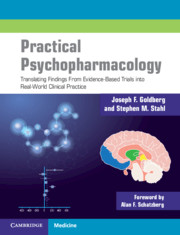 Practical Psychopharmacology
Practical Psychopharmacology Book contents
- Practical Psychopharmacology
- Practical Psychopharmacology
- Copyright page
- Dedication
- Contents
- Foreword
- Preface
- Abbreviations
- Part I General Principles
- 1 Core Concepts of Good Psychopharmacology
- 2 Targets of Treatment: Categories versus Dimensions of Psychopathology
- 3 Interpreting and Using the Literature: Integrating Evidence-Based Trials with Real-World Practice
- 4 Placebo and Nocebo Effects
- 5 Tailoring the Fit: Moderators and Mediators of Treatment Outcome
- 6 Complex Regimens and Rationale-Based Combination Drug Therapies
- 7 Laboratory Values and Psychiatric Symptoms: What to Measure, What Not to Measure, and What to Do With The Results
- 8 Pharmacogenetics: When Relevant, When Not
- 9 Cross-tapering and the Logistics of Drug Discontinuation
- 10 Managing Major Adverse Drug Effects: When to Avoid, Switch, or Treat Through
- 11 Novel Drug Therapeutics: Nutraceuticals, Steroids, Probiotics, and Other Dietary Supplements
- 12 Human Diversity and Considerations in Special Populations
- Part II Targets of Pharmacotherapy
- References
- Index
5 - Tailoring the Fit: Moderators and Mediators of Treatment Outcome
from Part I - General Principles
Published online by Cambridge University Press: 19 October 2021
- Practical Psychopharmacology
- Practical Psychopharmacology
- Copyright page
- Dedication
- Contents
- Foreword
- Preface
- Abbreviations
- Part I General Principles
- 1 Core Concepts of Good Psychopharmacology
- 2 Targets of Treatment: Categories versus Dimensions of Psychopathology
- 3 Interpreting and Using the Literature: Integrating Evidence-Based Trials with Real-World Practice
- 4 Placebo and Nocebo Effects
- 5 Tailoring the Fit: Moderators and Mediators of Treatment Outcome
- 6 Complex Regimens and Rationale-Based Combination Drug Therapies
- 7 Laboratory Values and Psychiatric Symptoms: What to Measure, What Not to Measure, and What to Do With The Results
- 8 Pharmacogenetics: When Relevant, When Not
- 9 Cross-tapering and the Logistics of Drug Discontinuation
- 10 Managing Major Adverse Drug Effects: When to Avoid, Switch, or Treat Through
- 11 Novel Drug Therapeutics: Nutraceuticals, Steroids, Probiotics, and Other Dietary Supplements
- 12 Human Diversity and Considerations in Special Populations
- Part II Targets of Pharmacotherapy
- References
- Index
Summary
Previous chapters have described ways in which “real-world” patients usually present with a diversity of psychiatric, medical, psychosocial, and other features that make a “one-size-fits-all” approach to treatment problematic. Large-scale randomized trials typically favor diagnostic uniformity so that all enrolled subjects more or less display the same kinds of symptoms under study. Consequently, the controlled trials literature that informs evidence-based practice largely comes from rarified, homogeneous study groups with rigidly defined diagnostic criteria. As a result, such studies trade off optimal outcomes (“efficacy”) for generalizability (“effectiveness”) under more ordinary conditions. This is why so-called “effectiveness” studies such as the Clinical Antipsychotics Treatment Intervention Effectiveness trial (CATIE; see Chapter 15) strive to enroll representative patients with comorbidities, imperfect treatment adherence, and issues with drug tolerability, adopting “bottom line” primary outcome measures such as “all-cause dropout.” No matter how well a treatment can work, the pragmatic concern remains how well it actually does work in real-life settings.
- Type
- Chapter
- Information
- Practical PsychopharmacologyTranslating Findings From Evidence-Based Trials into Real-World Clinical Practice, pp. 89 - 106Publisher: Cambridge University PressPrint publication year: 2021


